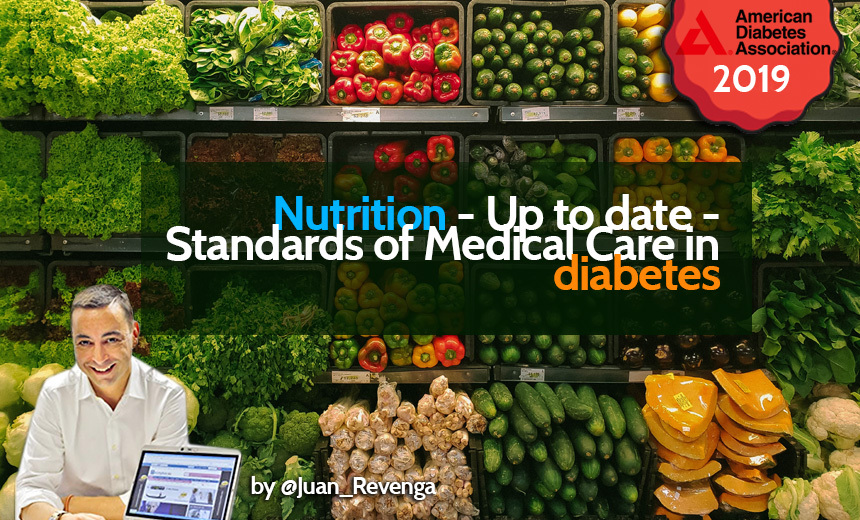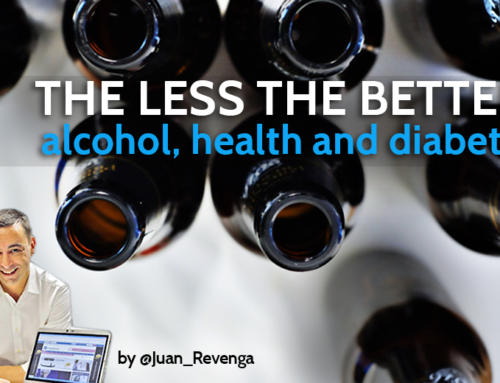Up to date – Standards of Medical Care in Diabetes- 2019
At the end of the year the American Diabetes Association published an update with standards for healthcare in the prevention and treatment of diabetes. Today we bring them closer to you and discuss nutritional issues
The American Diabetes Association (ADA) “Standards of Medical Care for Diabetes” include the most current clinical practice recommendations. Diabetes Care is a journal for the health care practitioner that is intended to increase knowledge, stimulate research, and promote better management of people with diabetes. Report delves into updates on all possible diabetes-related issues.

Under the heading lifestyle management, here we are focusing deeply into Nutrition Therapy section.
Improving Care and Promoting Health in Populations
Classification and Diagnosis of Diabetes
Prevention or Delay of Type 2 Diabetes
Comprehensive Medical Evaluation and Assessment of Comorbidities
Obesity Management for the Treatment of Type 2 Diabetes
Pharmacologic Approaches to Glycemic Treatment
Cardiovascular Disease and Risk Management
Microvascular Complications and Foot Care
Lifestyle Management: Nutrition Therapy
Nutrition Therapy is one of the most challenging part of the treatment plans. There is not a one-size-fits-all eating pattern for individuals with diabetes, and meal planning should be individualized. Making an individualized nutrition plan achieves better dietary adherence by considering the tastes of everyone: culture, religion, traditions, economic possibilities, etc., beyond their metabolic goals of course.
T he ADA recommends registered dietitian as the professionals who should take the lead in addressing nutritional therapy. This document recommends looking at general dietary patterns, specifically the Mediterranean diet, the DASH (Dietary Approach to Stop Hypertension) diet, and diets based on vegetables foods, which have demonstrated their benefits in various publications.
he ADA recommends registered dietitian as the professionals who should take the lead in addressing nutritional therapy. This document recommends looking at general dietary patterns, specifically the Mediterranean diet, the DASH (Dietary Approach to Stop Hypertension) diet, and diets based on vegetables foods, which have demonstrated their benefits in various publications.
Any of these three approaches would serve as a guide to prioritize dietary patterns based on food choices with a high concentration of nutrients including vegetables, fruits, legumes, dairy products, lean foods rich in protein, nuts, seeds and foods made with whole grains.
Key and sometimes breaker messages
On the specific proportion of macronutrients in the diet, this paper makes it clear once again that there is no ideal proportion of macronutrients that is useful to everyone.
On the presence of carbohydrates, the index and the glycemic load of foods in the diet, the ADA´s publication states that up to date the studies reveal very varied results and that it is therefore not possible to issue a specific recommendation on it. However, it also mentions that low-carbohydrate diets (with varying definitions) appear to provide some benefits in cases of type 2 diabetes and pre-diabetes. However, such diets may be contraindicated in pregnant women, during lactation, kidney patients and patients with eating disorders, as well as being observed with great caution in patients undergoing pharmacological treatment with SLGT2 inhibitors (a class of oral antidiabetics).
Regarding the amount of protein, there is also no evidence to mention a specific amount or range of protein in the dietary management of diabetes. However, in cases where diabetic nephropathy also exists, it is recommended not to exceed the amount of 0.8g of protein per kilogram of body weight per day.
The optimal amount of fat in the diabetic patient’s diet is also controversial or unclear, and it is more important to look at the nature of these fats (their fatty acid profile) or, in other words, in dietary choices, with foods rich in mono- and polyunsaturated fatty acids. Obtained, it is insisted, from foods, not from supplements.
On the amount of sodium in the diet of diabetic patients the recommendation is the same as for the non-diabetic population: not to exceed the amount of 2,300 mg per day (equivalent to about 5.8 grams of salt). Moreover, even patients with hypertension should not be given reductions of less than 1,500 mg of sodium per day (3.8 grams of salt) as these strategies result in poor patient acceptability.
This work discourages the use of vitamins, minerals, antioxidants or herbal preparations (e.g. cinnamon, turmeric, etc.) in patients with diabetes for whatever purpose, given the lack of evidence of their efficacy and the gaps in their long-term safety.
Regarding the consumption of alcoholic beverages, the ADA recognizes certain risks in the diabetic patient related to hypo glycaemia, hyper glycaemia and weight gain. In this sense, if the diabetic patient chooses to drink, the recommendations are the same as for the general population: do not exceed 2 drinks per day for men and 1 for women (note: in this paper “1 drink” is equal to 350 mL of beer; 150 mL of wine; or 44 mL of any distilled drink).
Caloric sweeteners are also the focus of attention, and while it mentions that their use may be a better option for those foods with sugars (or honey, or syrups) the ADA recommends improving choices and opting for foods and beverages that are not susceptible to be sugary or sweetened. As already mentioned in two previous articles on this blog (this one and this one), some articles have highlighted a greater risk of weight gain with the use of sweeteners from certain physiological models.
My summary
After so much information it’s time to make a super summary, at least from my perspective. After reading this interesting and updated document, it seems clearer and clearer to me:
- If one of the greatest difficulties for patients with diabetes is precisely “complying” with dietary recommendations, the individualization of these recommendations is a fundamental piece in achieving the necessary adherence.
- We also know that there is no single diet for the patient with diabetes that is universally applicable to all of them. There are as many as there are patients.
In the end, “eat like a diabetic not to become diabetic” (in most cases of type 2 diabetes) must be our motto, both to prevent and to treat cases of diabetes.
Latest posts by Juan Revenga Frauca (see all)
- Obesity recognized as a chronic disease - 13 October, 2021
- Who said you have to eat everything? - 7 October, 2021
- Diabetes and Alzheimer - 29 January, 2021









